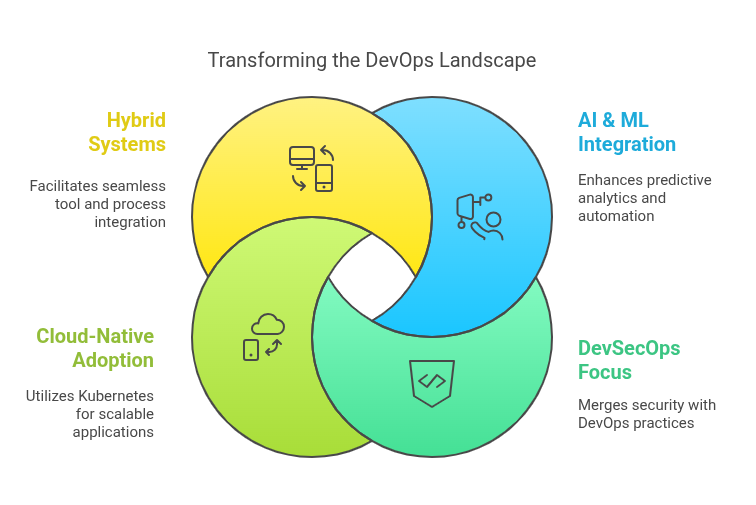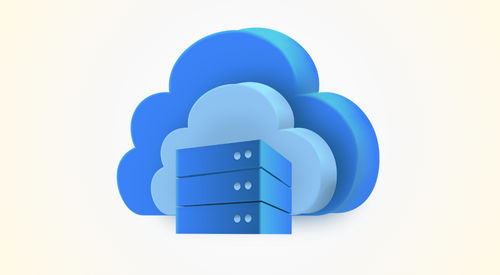

According to industry reports, the global DevOps market size will expand at a 20% CAGR in the coming years, reaching multi-billion-dollar valuations by the end of the decade. Implementing DevOps tools together with CI/CD pipelines and Infrastructure as Code (IaC) and DevSecOps across businesses of all company sizes is driving this market expansion. This blog analyses modern DevOps market conditions alongside key development motivators and upcoming growth opportunities.
Enhance Agility with AI-driven DevOps Solutions
The DevOps market has witnessed significant growth in recent years as organizations need swifter software development while achieving higher operational efficiency through better communication between development and IT teams. Cloud computing and AI-powered automation and containerization create rapid transformations in the DevOps environment as these trends gain popularity across industries.
Global DevOps Market Overview
The global DevOps market demonstrates consistent momentum in its market expansion. Various reports from MarketsandMarkets, IMARC Group, and Global Market Insights indicate the following:
- According to MarketsandMarkets, the DevOps market was valued at USD 10.4 billion in 2023 and is projected to reach USD 25.5 billion by 2028, growing at a compound annual growth rate (CAGR) of 19.7% during this period
- North America currently leads the market, with the APAC and European regions following behind.
- DevOps adoption remains at its highest among the BFSI, IT & Telecom, Healthcare, and Retail sectors.
Key Factors Driving DevOps Adoption
- Increased Cloud Adoption: The adoption of DevOps tools has increased as more businesses have transitioned to cloud computing platforms with hybrid and multicloud models.
- Need for Faster Software Deployment: Through DevOps methodology, organizations can conduct CI/CD operations to minimize their development timelines.
- Rise of Microservices & Containerization: Technologies like Docker and Kubernetes are driving DevOps automation.
- Security & Compliance (DevSecOps): The growing focus on cybersecurity is leading to enhanced integration of security into DevOps processes.
- AI & Automation in DevOps: AI-driven monitoring, self-healing systems, and automated workflows are enhancing DevOps efficiency. AI is also enhancing predictive capabilities and operational efficiency in DevOps processes.

Image 1: Key Trends Shaping DevOps Market
Key Trends Shaping the DevOps Market
#1: The Rise of AI & ML in DevOps (AIOps) – Through the introduction of predictive analytics, anomaly detection, and intelligent automation into software development and operations, artificial intelligence (AI) and machine learning are transforming DevOps. Combining DevOps with AI systems (AIOps) allows organizations to actively track system performance, helping them detect failure risks in advance and automate diagnostic processes.
The implementation of AI insights helps teams reduce operational interruptions while improving productivity levels and resource distribution. This creates advanced DevOps pipelines that are quick and dependable. As AI technology continues to advance, we can expect advanced self-healing infrastructure and autonomous CI/CD pipelines to become a reality, largely reducing human intervention in DevOps processes.
#2: Increased Focus on DevSecOps – The growing number of cyber threats has made DevSecOps the top organizational priority. In this strategy, security gets merged with DevOps practices, making it a fundamental part of the development process. Physical infrastructure security traditionally operated as a standalone stage in development, but DevSecOps implements its protections throughout the CI/CD pipeline execution.
Security integration helps developers locate vulnerabilities before the actual system deployment occurs. The fusion of automated security testing with compliance monitoring and zero-trust architectural models allows enterprises to cut down on security risks while achieving faster, more secure software delivery. As new regulatory standards develop, businesses will require DevSecOps to stay as a fundamental element of modern DevOps strategies.
#3: Cloud-Native DevOps & Kubernetes Adoption – Cloud-native technology has redefined how companies implement and handle their applications. Modern DevOps strategies depend on Kubernetes and containerization as their core foundation to build applications that scale, are resilient, and remain portable.
Modern organizations use GitOps to rely on Git repositories for maintaining a unified source of truth for infrastructure and application deployments. The automated deployment process achieves higher efficiency because it maintains standardization along with simplified error correction protocols. As businesses continue to adopt hybrid and multi-cloud frameworks, digital transformation will increasingly depend on Kubernetes and cloud-native DevOps strategies.
#4: Shift to Hybrid Systems – Organizations are transitioning from traditional data centers to hybrid cloud systems, which is significantly driving market growth. Hybrid systems enable the seamless integration of tools and processes across environments, helping to achieve better collaboration between development and operations teams.
Hybrid systems support diverse workloads and applications, making them suitable for organizations with varied operational requirements. DevOps practices like CI/CD pipelines can be implemented across hybrid environments, enhancing efficiency and reducing manual intervention.
Competitive Landscape: Major DevOps Players
The DevOps market is dominated by key technology providers, cloud platforms, and open-source tools. Major players include:
- DevOps Tool Vendors
- Jenkins, GitLab, GitHub Actions, Atlassian (Bitbucket, Bamboo), CircleCI – Leading CI/CD tools
- Terraform, Ansible, Chef, Puppet – Infrastructure as Code (IaC) solutions
- Splunk, Datadog, New Relic, Dynatrace – Monitoring & observability tools
- Cloud Providers Driving DevOps Adoption
- Google Cloud (Cloud Build, Anthos, Kubernetes Engine)
- AWS (AWS DevOps, CodePipeline, CodeBuild)
- Microsoft Azure (Azure DevOps, GitHub Actions)
Future Outlook: What’s Next for DevOps
#1: AI-Driven DevOps & NoOps – The integration of AI and machine learning into DevOps, often referred to as AIOps, is transforming how organizations manage IT operations. By implementing DevOps with AI capabilities, organizations can monitor systems in real time to detect anomalies and then automatically solve incidents, thus minimizing operational downtime for better productivity.
AI technology development continues to propel the concept of NoOps forward since it supports application management and infrastructure automation with minimal need for human operators. Developers can dedicate their efforts exclusively to innovation through an AI-led system that takes charge of application deployment, system scaling, and problem resolution functions.
#2: DevOps for Edge Computing & IoT – With the rapid expansion of edge computing together with the Internet of Things (IoT), DevOps practices are evolving to support decentralized infrastructure. The emphasis of Edge DevOps diverges from regular cloud-based DevOps because it specializes in handling dispersed network systems together with instant processing and time-sensitive program operation.
Businesses use containerization along with orchestration tools like Kubernetes to execute and handle edge workloads efficiently. DevOps positions itself as essential for industries adopting IoT solutions because it handles the management of edge environments for seamless connectivity while providing security and performance in healthcare, automotive, and smart cities sectors.
#3: Serverless & Event-Driven Architectures – As developers are no longer burdened by infrastructure management responsibilities, serverless computing is transforming the DevOps workflow. The serverless environment gives cloud providers full authority to manage, scale, and maintain resources so that developer teams can devote all efforts to application development.
The DVA capabilities of Google Cloud Functions provide efficient microservice execution while keeping costs affordable, making it a preferred choice for modern cloud-native applications.
Conclusion
The worldwide DevOps industry is expanding rapidly as firms adopt cloud solutions and AI-driven automation. AIOps, DevSecOps, Kubernetes, and serverless computing are among the latest technologies driving a paradigm shift in application development and deployment management. Modern organizations that use hybrid and multi-cloud systems continue to rely on DevOps for increased agility, scalability, and operational efficiency. DevOps will pave the way for intelligent automated operations that prioritise security as part of digital transformation programs across sectors, thanks to developments in edge computing and event-driven architecture.
Niveus Solutions, a leading cloud and digital transformation partner, helps organisations across the world accelerate DevOps adoption. We specialise in cloud-native technology.
As a leading cloud and digital transformation partner, Niveus Solutions plays a key role in accelerating DevOps adoption for businesses worldwide. Specializing in cloud-native technologies, CI/CD automation, and DevSecOps, Niveus helps organizations streamline software delivery, optimize infrastructure, and enhance resilience. By leveraging AI-driven monitoring, predictive analytics, and self-healing systems, Niveus ensures enterprises stay ahead in the evolving DevOps landscape. With a commitment to innovation and agility, we empower businesses to navigate complex DevOps challenges and accelerate their digital transformation journey.ty, scalability, and success in their long-term cloud journey.











